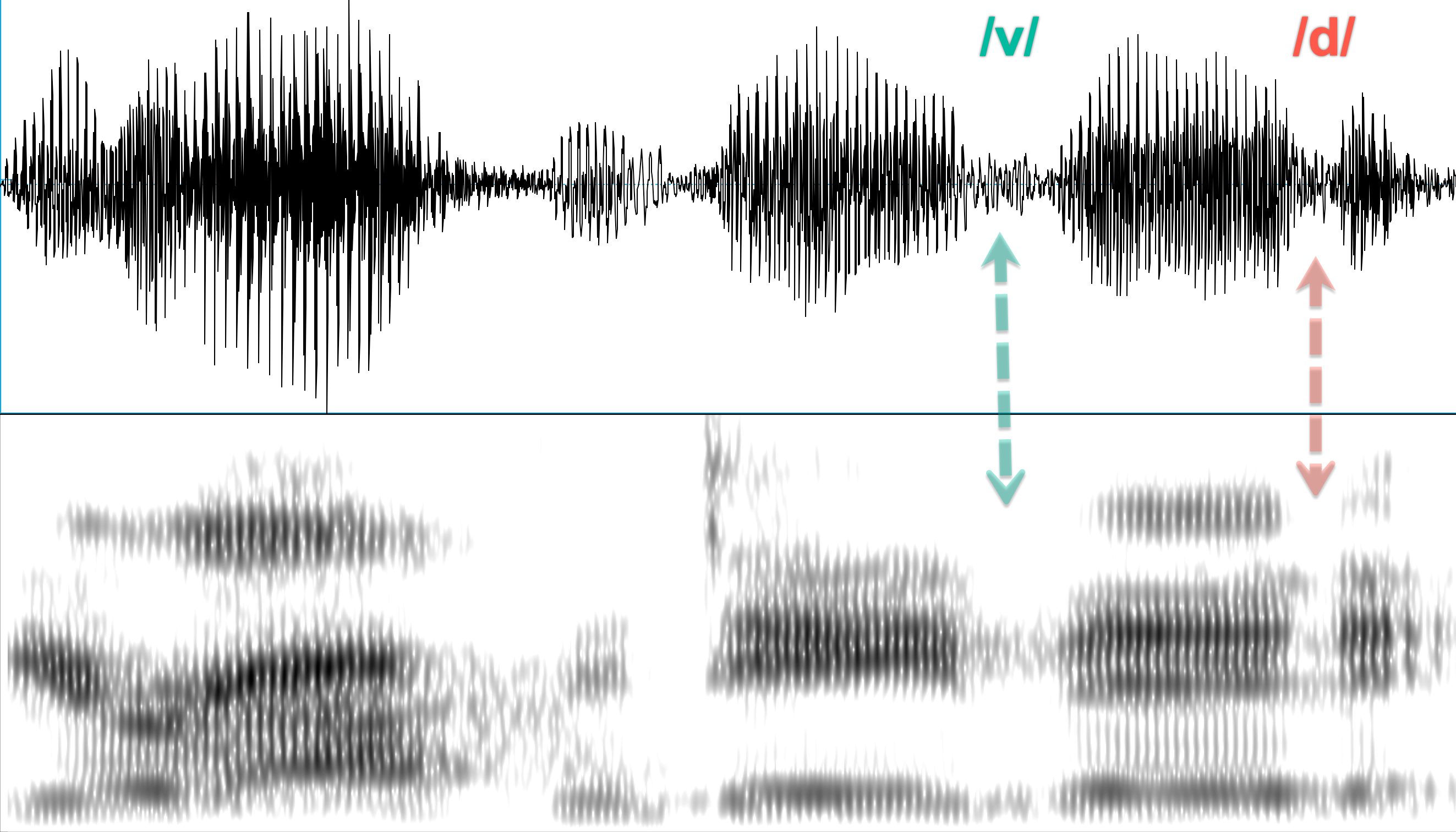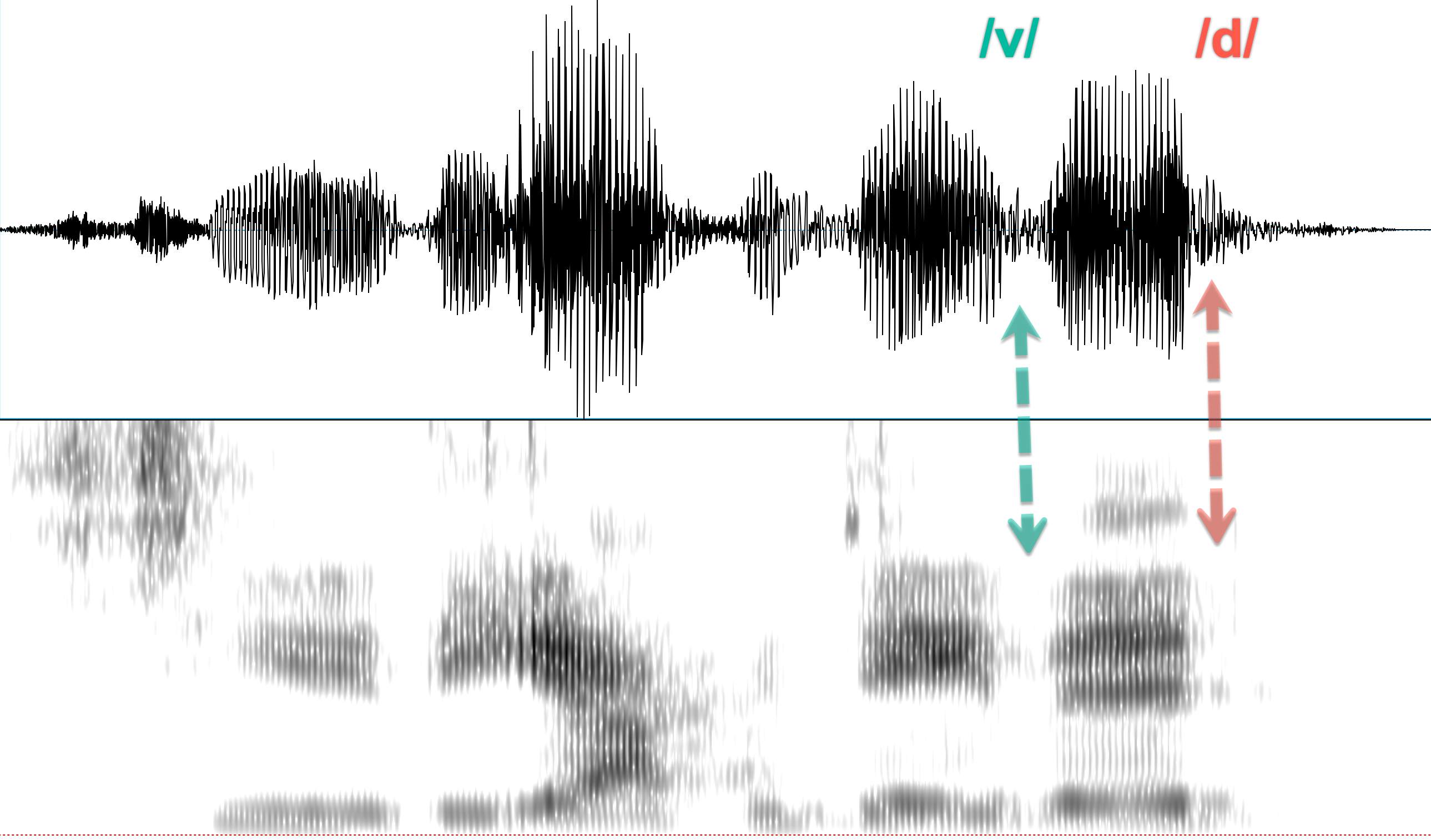Affidavid
« previous post | next post »
From Barbara Philips Long:
It is my impression that this lawmaker is pronouncing affidavit with a terminal -d instead of -t, regardless of the phonemes in the following words.
Listening to the audio, I agree with the judgment:
Mr. Braynard, I
did have a chance
to read through your affidavit
and look at
the exhibits that you attached
to the affidavit
If we look at the waveform and spectrogram, we can see the reasons. In the first version of the word, the speaker actually releases the (clearly voiced) final consonant into a short epenthetic vowel:
In the second pronunciation, the final consonant is unreleased, but there's still about 60 msec of voicing following the closure:
In both cases, the final unstressed vowel is longer than we'd expect for /ɪ/ before a voiceless stop (160 msec, 150 msec), even in phrase-final position, For comparison, the five versions of the word affidavit in this 2016 Morning Edition story have vowel final durations of 112, 94, 68, 73, 50 msec. Here's the first (and longest) of these, in which we can also see clear sign of glottalization in the increased spacing of glottal pulses at the end:
This will remind some readers of a passage in Cecily Strong's SNL parody of Melissa Carone's recent Michigan hearing testimony:
I don't know how common the "affidavid" pronunciation is, but it's a natural development, given that American English flaps and voices word-final /t/ when a following word starts with a vowel.



Thomas Hutcheson said,
December 12, 2020 @ 3:56 pm
I must have been in [East Texas] HS before knowing the word was written with a final "t"
wanda said,
December 12, 2020 @ 4:08 pm
I'm surprised you all haven't commented on the Atlantic's article, "Is Trump Trying to Stage a Coup?" from Dec. 7, 2020, which not only claims that the "Inuit have many words for snow" idea has been affirmed but also asserts that Turkish has many words for coup. (The article asserts that Turkish has many words for types of coup in general, but a lot of the examples refer to specific coups- it is not surprising that if a country has had a lot of coups, there would be particular words or phrases designating which one you are talking about.)
Leslie Katz said,
December 12, 2020 @ 5:48 pm
In Dickens's Our Mutual Friend, "Rogue" Riderhood calls an affidavit an "Alfred David".
Brett said,
December 12, 2020 @ 6:17 pm
Cecily Strong's pronunciation was directly parodying Melissa Carone's own pronunciation with the terminal /d/. In fact, even before the Saturday Night Live episode aired, Parker Malloy had already pointed out that both Carone's diction and delivery were very close to Strong's character of the Girl You Wish You Hadn't Started a Conversation with at a Party. (Carone's pronunciation of "affidavit" can be heard clearly in the linked video, but given her intoxicated affect, it would be hard to conclude based on a single occurrence what her normal pronunciation of the word would be. However, if you watch the full video of her testimony, she says "affidavit" with a final /d/ multiple times.)
[(myl) Indeed:
https://youtu.be/gHkehB3oC6Q?t=158
]
Scott Weller said,
December 12, 2020 @ 6:48 pm
I don't remember who was king before David, but Solomon was the king affidavid. (With apologies to Ogden Nash)
[(myl) I wonder whether Ogden Nash's poem inspired the SNL writers…]
David Morris said,
December 12, 2020 @ 8:19 pm
Despite my given name, I have never heard 'affidavit' as having a final 'd'. then again, I haven't heard it much anyway. (I am not a lawyer.)
Tim Now Sir Simon Poshlord said,
December 12, 2020 @ 9:47 pm
Old joke: "I was walking with my friend David when this lawyer chased us down, waving this piece of paper at us."
"Affidavit?"
"No, he was after me."
Thank you.
Andrew Usher said,
December 12, 2020 @ 11:27 pm
I know of the pronunciation 'affidavid', but indicating the speaker's ignorance. (Is influence by the name 'David' really possible here?)
Not that it matters, but I can't call that Ogden Nash piece a 'poem'. It's not bad, but I can only read it as prose.
k_over_hbarc at yahoo.com
unekdoud said,
December 13, 2020 @ 1:31 am
If I were unfamiliar with the term and had to choose between spelling a final -t and final -d, I might also lean towards -d based on available words.
Philip Taylor said,
December 13, 2020 @ 5:50 am
Well, quoting Wikipedia, "[a] davit is any of various crane-like devices used on a ship for supporting, raising, and lowering equipment such as boats and anchors", so given a choice between modelling the sound on "David" and modelling it on "davit" there would seem to be no a priori reason for preferring one over the other.
And as someone who has no daily involvement in matters legal, I encounter the word far more frequently in print rather than in speech, and would instinctively assume that it is pronounced much as it is spelled.
Ralph Hickok said,
December 13, 2020 @ 9:01 am
@Andrew Usher
I'm guessing that you're not familiar with Ogden Nash's poetry.
Andrew (not the same one) said,
December 13, 2020 @ 10:18 am
If I remember rightly, that particular work of Nash's is not written in his normal 'rhymes but does not scan' style, but just as a series of sentences, each on a new line. So I am inclined to agree it is prose.
[(myl) Leaves of Nash? But (free verse aside) there are some rhymes…]
Robert Coren said,
December 13, 2020 @ 10:54 am
@Scott Weller: I'm pretty sure Nash spelled "affidavit" with a T even in that line.
@Ralph Hickok: Many of Nash's verses are made up of unmetered rhymed couplets (often with deliberately strained rhymes, most of which are absolutely brilliant), but there are also quite a few that are made up of what appear to be prose sentences separated by some kind of paragraph-like mark. "Mr. Ballantine's Valentine" is one of such; others include various instances of "The Strange Case Of…"
(Mr. Donnybrook's Boredom, etc.)
ohwilleke said,
December 13, 2020 @ 5:35 pm
I'm a lawyer who has never heard anyone IRL pronounce the word as "affidavid" and I presume that it because it is a regional dialect thing.
Chester Draws said,
December 13, 2020 @ 8:04 pm
A rugby star in NZ in a scandal caused much mirth when he wrote: "My coach say if u do a afterdavid think the media will go away and won't come up."
Anne Roebel said,
December 13, 2020 @ 11:46 pm
Midwestern lawyer here (Indiana). I think it’s pretty common to hear it sound like “affidavid” here (even in the legal field, even by people who know how to spell it) with the way final consonants are clipped/swallowed in my accent…the distinction between a final t/d is fairly small. That could easily be a source of confusion…
Akito said,
December 14, 2020 @ 6:31 am
"Congrajulate" rather than "congrachulate" now seems to be the more common AmE pronunciation for "congratulate". As an EFL learner, I accept it as fact, but wonder if this is an isolated case or part of a tendency.
[(myl) There's a general tendency in American English (and some other varieties) for lenition of intervocalic consonants when the second vowel is unstressed. When the consonant is /t/, this regularly produces (flapping and) voicing, perhaps for the reasons discussed in "Hysteresis" (12/4/2020). So it's not a surprise to see a similar effect with a palatal consonant — but this version of "congratulate" indeed seems to have been lexicalized.]
Scott Weller said,
December 15, 2020 @ 8:40 am
@Robert Coren: I'm pretty sure you're right. I waffled for quite a while over which way to spell it myself.
Martha said,
December 15, 2020 @ 3:32 pm
I'm pretty sure I first heard the word "affidavit" watching To Tell The Truth (the John O'Hurley version). At least, I remember thinking that O'Hurley couldn't have been pronouncing that word correctly and then looking it up and being somewhat surprised to learn that he was. I don't know whether I'd heard the "affidavid" pronunciation previously, or if "affidavit" just sounded unnatural to me.
Robert said,
December 22, 2020 @ 12:17 pm
Long John Silver called it an "affy-davy". I don't know what Stevenson based that on.